
Researchers
Dr Leah Astbury
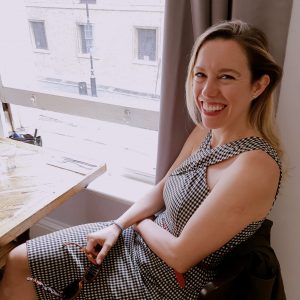 Leah Astbury is a historian of early modern gender, family and medicine and a Postdoctoral Research Associate on the ‘Sleeping well in the Early Modern World’ project. Previously she was a Wellcome Trust Postdoctoral Fellow at the Department of History & Philosophy of Science, University of Cambridge (2018-2021) where she was researching the relationship between marriage and health in early modern England.
Leah Astbury is a historian of early modern gender, family and medicine and a Postdoctoral Research Associate on the ‘Sleeping well in the Early Modern World’ project. Previously she was a Wellcome Trust Postdoctoral Fellow at the Department of History & Philosophy of Science, University of Cambridge (2018-2021) where she was researching the relationship between marriage and health in early modern England.
In 2017-18 she was the Molina Fellow in the History of Medicine and Allied Sciences at the Huntington Library, San Marino. Prior to this she held fellowships from the Society of Renaissance Studies and The Oxford Research Centre for the Humanities (TORCH). She completed her PhD in 2016 at the University of Cambridge, titled ‘Breeding Women and Lusty Infants in Seventeenth-Century England’, which examined the experience of pregnancy, childbirth and after-birth care.
She has published on the history of medicine, childbirth and the family.
Professor Hannah Barker
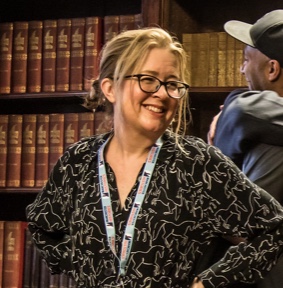 Hannah’s research focuses largely on the late Georgian period and the early industrial revolution in Britain, and on the north of England in particular. However, an interest in local and community history means that she is also active in research on twentieth-century Britain. Some of her early publications were on print culture, popular politics and public opinion and examined the relationship between press and public, and specifically the degree to which social elites could control print and direct the nature of public debate.
Hannah’s research focuses largely on the late Georgian period and the early industrial revolution in Britain, and on the north of England in particular. However, an interest in local and community history means that she is also active in research on twentieth-century Britain. Some of her early publications were on print culture, popular politics and public opinion and examined the relationship between press and public, and specifically the degree to which social elites could control print and direct the nature of public debate.
More recent research has concentrated on issues of gender, work, family and religious faith in towns. She has assessed the impact of industrialisation on women’s employment, and specifically the degree to which the advent of modern capitalism marginalised women workers in her book The Business of Women (2007). Her most recent monograph, Family and Business During the Industrial Revolution (2017) builds upon this intervention and examines the concept of ‘family strategy’ in terms of small family businesses and the emotional lives of families. Family and Business won the Social History Society Book of the Year for 2019. You can find more details of this project as well as an online searchable project website for family and local historians here.
She has recently completed a project on banknote forgery and retailers in London with Sarah Green (Open Access article in the Journal of British Studies). She is currently working on a monograph with Kate Gibson, Jeremy Gregory and Carys Brown on religion in northern English towns, 1740-1830. The research for this book was funded by the AHRC and you can find further details here. Working on Faith in the Town meant that Hannah has spent a lot of time conducting research in museums looking for examples of the material culture of domestic piety. She is also involved in a multi-disciplinary AHRC project on the Mary Hamilton papers with David Denison, Nuria Yáñez-Bouza, Sophie Coulombeau, Cassie Upph, Tino Oudesluijs and Christine Wallis, and is part of a team working on the AHRC-funded ‘Our Heritage, Our Stories: Linking and searching community-generated digital content to develop the people’s national collection’ based at The National Archives and the Universities of Glasgow and Manchester.
More information here.
Dr Alison Bennett
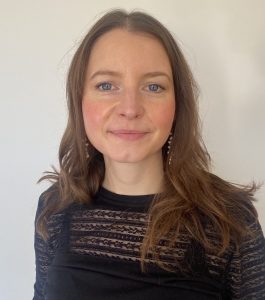 Dr Alison Bennett is an historian of the British Empire with special interests in the colonial history of eastern Africa which she studies predominantly through a cultural, visual, and material lens. She is particularly interested in the intersections between material and visual culture, imperial politics, and religion in Uganda. Her latest (forthcoming) article examines the embodied history of Catholic material culture in late-nineteenth century Buganda.
Dr Alison Bennett is an historian of the British Empire with special interests in the colonial history of eastern Africa which she studies predominantly through a cultural, visual, and material lens. She is particularly interested in the intersections between material and visual culture, imperial politics, and religion in Uganda. Her latest (forthcoming) article examines the embodied history of Catholic material culture in late-nineteenth century Buganda.
Ali gained her PhD from UCL where she was awarded a Collaborative Doctoral Award in conjunction with the British Museum to study the history of colonial ethnographic collecting in eastern Africa. She is currently completing a monograph based on this research.
After finishing her doctorate, she was awarded postdoctoral research fellowships at the Paul Mellon Centre for Studies in British Art and the Smithsonian Institution. She has also worked closely with institutions including the V&A and the National Trust on the topics of slavery and colonialism, and served as a researcher for Broccoli Productions’ Human Resources podcast which explores Britain’s involvement in the transatlantic slave trade.
Dr Anke Bernau
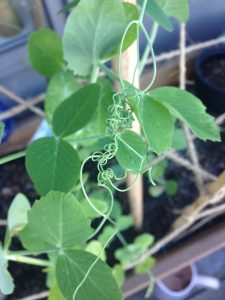 My name is Anke Bernau and I am Senior Lecturer in Medieval Literature and Culture. My research interests and publications have covered a range of topics, from female virginity in Western thought (medieval to modern), to cinematic medievalisms, medieval and early modern origin myths, and the affective and cognitive possibilities of poetic form. In 2007, I published Virgins: A Cultural History, which was translated into German and Japanese. I have also co-edited three volumes: Medieval Virginities (2003, with Ruth Evans and Sarah Salih); Medieval Film (2009, with Bettina Bildhauer); and Sanctity as Literature in Late Medieval Britain (2015, with Eva von Contzen).
My name is Anke Bernau and I am Senior Lecturer in Medieval Literature and Culture. My research interests and publications have covered a range of topics, from female virginity in Western thought (medieval to modern), to cinematic medievalisms, medieval and early modern origin myths, and the affective and cognitive possibilities of poetic form. In 2007, I published Virgins: A Cultural History, which was translated into German and Japanese. I have also co-edited three volumes: Medieval Virginities (2003, with Ruth Evans and Sarah Salih); Medieval Film (2009, with Bettina Bildhauer); and Sanctity as Literature in Late Medieval Britain (2015, with Eva von Contzen).Professor Hannah Cobb
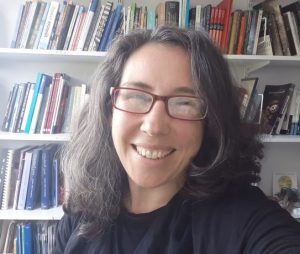 Hannah Cobb (SFHEA, MCIfA, FSA., FSA Scot.) is a Professor of Archaeology and Pedagogy at the University of Manchester. She is the University’s Lead for Academic Development, and Associate Director for Teaching and Learning in the School of Arts Languages and Cultures.
Hannah Cobb (SFHEA, MCIfA, FSA., FSA Scot.) is a Professor of Archaeology and Pedagogy at the University of Manchester. She is the University’s Lead for Academic Development, and Associate Director for Teaching and Learning in the School of Arts Languages and Cultures.
Hannah undertakes award winning teaching and fieldwork (University of Manchester Teaching Excellence Award 2018, Archaeology Training Forum award 2014), and is a director of the multi period Ardnamurchan Transitions Project (2006 – present). She also co-directed the Western Pennines Mesolithic Project (2017) and the Whitworth Park Community Archaeology and History Project (2010-2014). She is one of the creators of the Archaeological Skills Passport, a Trustee of the Enabled Archaeology Foundation and, between 2015 and 2022 she founded and chaired the Chartered Institute for Archaeologists Equality and Diversity Group. She is also one of the leads of the University of Manchester’s Prehistory to Primary Schools Project. She published, among others, Assembling Archaeology: Teaching, Practice and Research (OUP, 2020), and Reconsidering Archaeological Fieldwork (Springer, 2012).
Dr Noelle Dückmann Gallagher
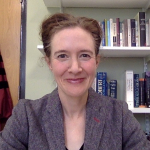 Dr Noelle Dückmann Gallagher is Senior Lecturer in Eighteenth-Century Literature and Culture at the University of Manchester. Her research focuses on British print culture between 1660 and 1800, with a particular interest in the medical or health humanities. Her first book, Historical Literatures: Writing About the Past in England, 1660-1740, was published by Manchester University Press in 2012 (paperback 2016), and her second book, Itch, Clap, Pox: Venereal Disease in the Eighteenth-Century Imagination, was published by Yale University Press in 2019. She has written extensively on representations of disease and illness, with recent publications exploring plague metaphors in eighteenth-century literature; breast cancer and the history of the emotions; and the alleged links between circumcision and sexual disease. Her work has appeared in BMJ: Medical Humanities, Literature and Medicine, ELH, SEL, Eighteenth-Century Life, and the Cambridge University Press Literature and Medicine volumes. Her research has been funded by grants from the Wellcome Trust and The Social Sciences and Humanities Research Council of Canada, and she is an elected fellow of the Royal Historical Society, as well as a member of the Northern Network of Medical Humanities Research and the Canadian, British, and American Societies for Eighteenth-Century Studies. She teaches in the English department and the Medical School.
Dr Noelle Dückmann Gallagher is Senior Lecturer in Eighteenth-Century Literature and Culture at the University of Manchester. Her research focuses on British print culture between 1660 and 1800, with a particular interest in the medical or health humanities. Her first book, Historical Literatures: Writing About the Past in England, 1660-1740, was published by Manchester University Press in 2012 (paperback 2016), and her second book, Itch, Clap, Pox: Venereal Disease in the Eighteenth-Century Imagination, was published by Yale University Press in 2019. She has written extensively on representations of disease and illness, with recent publications exploring plague metaphors in eighteenth-century literature; breast cancer and the history of the emotions; and the alleged links between circumcision and sexual disease. Her work has appeared in BMJ: Medical Humanities, Literature and Medicine, ELH, SEL, Eighteenth-Century Life, and the Cambridge University Press Literature and Medicine volumes. Her research has been funded by grants from the Wellcome Trust and The Social Sciences and Humanities Research Council of Canada, and she is an elected fellow of the Royal Historical Society, as well as a member of the Northern Network of Medical Humanities Research and the Canadian, British, and American Societies for Eighteenth-Century Studies. She teaches in the English department and the Medical School.
Dr Abigail Greenall
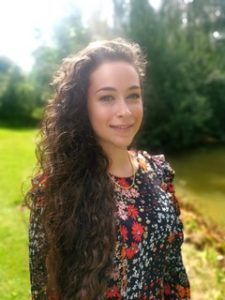 Abigail is a Visiting Early Career Research Fellow at The John Rylands Research Institute who explores the emotional landscape of the years between 1500–1700. She is especially interested in beliefs, practices, material culture and everyday life within households in the post-Reformation period.
Abigail is a Visiting Early Career Research Fellow at The John Rylands Research Institute who explores the emotional landscape of the years between 1500–1700. She is especially interested in beliefs, practices, material culture and everyday life within households in the post-Reformation period.
Abigail has completed her ESRC funded PhD in History under the supervision of Professor Sasha Handley and Prof Stefan Hanß. Her thesis, entitled ‘Nurturing Happiness: Affective Health and Wellbeing in the North West of England, c.1550–1700’, is part of a broader collaborative project with the National Trust’s Little Moreton Hall, Cheshire. This project contributes to current debates in the history of emotion and healthcare by rehabilitating a positive history of affective health and wellbeing in the sixteenth and seventeenth centuries. The thesis challenges long-held assumptions about the period and establishes that people could and frequently did attain happiness in practice. It examines manuscript recipe collections and personal testimonies for evidence that shows how early modern people sought and thought about happiness through their body’s physicality. It also teases out the diversity of ways that people of different ages, genders and religious confessions actively invested in their happiness. To achieve this it recreates the lived material environments of eight households from across the North West of England and probes the families’ everyday experiences of living with a range of objects whose material qualities enabled them to feel a range of happy feelings.
Abigail completed both her Bachelors and Masters in History at the University of Manchester in 2017 and 2019. She examined over 540 manuscript letters contained in the Moreton family archives for her Masters dissertation. Abigail has been adapting the dissertation into a journal article alongside her PhD. This detailed case study is the first work to uncover equanimity as an important emotional ideal in early modern England. It is forthcoming in the English Historical Review in 2023.
Dr Catherine Evans
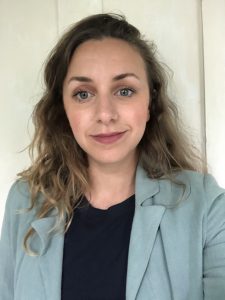 Catherine is an early modernist with interests in book history, material cultures, religious literature, women’s writing, and the philosophy of time. Her research has been supported with fellowships from the Institute for Advanced Studies in the Humanities at the University of Edinburgh, the Huntington Library, the UCLA-Clark Library, and the University of McGill. She has taught at the Universities of York, Edinburgh, and Sheffield, where she completed her PhD in 2019. Her doctoral thesis explored how early modern readers and writers experienced books in time, and how the materiality of books enforced specific readerly responses and actions, examining the relationships between text and speech, books and events, and materiality and emotion. Since 2018 Catherine has been a research assistant on the Gateway to Early Modern Manuscript Sermons project, based at the University of Regina.
Catherine is an early modernist with interests in book history, material cultures, religious literature, women’s writing, and the philosophy of time. Her research has been supported with fellowships from the Institute for Advanced Studies in the Humanities at the University of Edinburgh, the Huntington Library, the UCLA-Clark Library, and the University of McGill. She has taught at the Universities of York, Edinburgh, and Sheffield, where she completed her PhD in 2019. Her doctoral thesis explored how early modern readers and writers experienced books in time, and how the materiality of books enforced specific readerly responses and actions, examining the relationships between text and speech, books and events, and materiality and emotion. Since 2018 Catherine has been a research assistant on the Gateway to Early Modern Manuscript Sermons project, based at the University of Regina.
She currently holds a Leverhulme Early Career fellowship for a project exploring the use of glass and pearls in devotional practice and writing in the seventeenth century. This work will explore how reflective materials acted as points of meditation, with globally traded goods held close to the bodies of religious believers. She has published work on topics including the psalm translations of Mary Sidney Herbert and Anne Lock, George Herbert’s reception history, and the marketing of early modern sermons.
Dr Holly Fletcher
 Dr Holly Fletcher is a cultural historian of the early modern period with a particular interest in the history of the body and its interactions with the material world. As of October 2021, she is a Postdoctoral Research Associate on the Wellcome Trust funded project ‘Sleeping Well in the Early Modern World: An Environmental Approach to the History of Sleep Care’ at the University of Manchester.
Dr Holly Fletcher is a cultural historian of the early modern period with a particular interest in the history of the body and its interactions with the material world. As of October 2021, she is a Postdoctoral Research Associate on the Wellcome Trust funded project ‘Sleeping Well in the Early Modern World: An Environmental Approach to the History of Sleep Care’ at the University of Manchester.
Before joining Manchester, she taught undergraduate History at the University of Sussex, where she convened a Special Subject on early modern witches and witch-hunts. She has also taught early modern European History and material culture at the University of Cambridge where she completed her PhD in 2020. Her doctoral thesis, which she is currently revising for publication as a monograph, examined the cultural significance of bodyweight in early modern Germany. As the first book-length study of bodyweight in early modernity, this project pioneers to uncover how ‘fatness’ and ‘thinness’ were understood in this period as well as the role of bodily form in shaping early modern experiences of the world. Her latest article based on this research, ‘“Belly-Worshippers and Greed Paunches”: Fatness and the Belly in the Lutheran Reformation’, was published in the journal German History in June 2021.
Prior to the completion of her PhD, Holly received her BA in History and MPhil in Early Modern History from the University of Cambridge. Her MPhil thesis examined a range of nude statuettes of an elderly woman from 1520s Germany and an adapted version of this dissertation was published as an article in Gender and History in 2020.
Dr Laura C. Forster
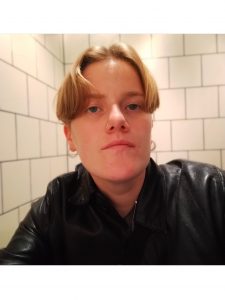 What moves people to political conviction? How do people become politicised? These questions have been the driving force of much of my research to date: from exiled French Communards of the 1870s, sex reform activists of the 1920s, mourners at Chartist funerals in the 1850s, to twenty-first century street artists, my work is concerned with how activists, political groups, and ordinary people experience and generate political ideas.
What moves people to political conviction? How do people become politicised? These questions have been the driving force of much of my research to date: from exiled French Communards of the 1870s, sex reform activists of the 1920s, mourners at Chartist funerals in the 1850s, to twenty-first century street artists, my work is concerned with how activists, political groups, and ordinary people experience and generate political ideas.
I am an historian of ideas, political cultures and political communities, primarily in the long nineteenth century. Particularly I am interested in the social, emotional and spatial contexts in which political ideas are developed and exchanged. I completed my PhD at King’s College London and I was a postdoctoral researcher at Birkbeck and a lecturer at Durham before taking up a Simon Fellowship at Manchester.
My book-in-progress, The Paris Commune in Britain: radicals, refugees, and revolutionaries after 1871, is concerned with the political exiles of the Paris Commune of 1871 and the longer intellectual and cultural afterlives of the Commune in Britain.
At Manchester I am now beginning a major new research project concerned with delineating the relationship between intimacy and radical politics in Britain c.1819-1914. Situated at the matrix of scholarship on class, emotion, and politics ‘Intimate radicalisms: feeling political in nineteenth-century Britain’ is an intimate history of ideas. The project interrogates the ways in which political and activist communities are forged in everyday life, and the encounters and atmospheres that facilitated both the spread and the development of socialist ideas, broadly understood, in nineteenth-century Britain.
Dr Kate Gibson
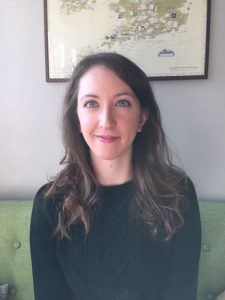 Kate researches the social, cultural and economic history of eighteenth-century Britain, with a particular focus on the history of the family and social inequality. She completed her PhD at the University of Sheffield in 2018, funded by the Wolfson foundation. She has held fellowships at the Huntington Library in California, The John Rylands Research Institute in Manchester and the Royal Archives at Windsor, and was the Centre for Research Collections Fellow at the Institute for Advanced Studies in the Humanities at the University of Edinburgh. In 2019, she joined the University of Manchester as a postdoctoral researcher on the AHRC-funded project, ‘Faith in the Town: Lay Religion, Urbanisation and Industrialisation in England, 1740-1830’, which examines the role of faith in perceptions of work, family life, space and time for ordinary people living in Northern English towns during a period of social and economic change. The monograph from this project, written with Hannah Barker, Jeremy Gregory and Carys Brown, is in its final stages. Kate’s research on illegitimacy, extra-marital sex, marriage and family life has been published in The Historical Journal, Past & Present, and Cultural and Social History (details here). Her first monograph based on her PhD research – Illegitimacy, Family and Stigma in England, 1660-1834 – will be published by Oxford University Press in 2022. Her current project, ‘Looked-After Children: Fostering and Adoption in Britain, 1700-1839’, is funded by a Leverhulme Early Career Fellowship.
Kate researches the social, cultural and economic history of eighteenth-century Britain, with a particular focus on the history of the family and social inequality. She completed her PhD at the University of Sheffield in 2018, funded by the Wolfson foundation. She has held fellowships at the Huntington Library in California, The John Rylands Research Institute in Manchester and the Royal Archives at Windsor, and was the Centre for Research Collections Fellow at the Institute for Advanced Studies in the Humanities at the University of Edinburgh. In 2019, she joined the University of Manchester as a postdoctoral researcher on the AHRC-funded project, ‘Faith in the Town: Lay Religion, Urbanisation and Industrialisation in England, 1740-1830’, which examines the role of faith in perceptions of work, family life, space and time for ordinary people living in Northern English towns during a period of social and economic change. The monograph from this project, written with Hannah Barker, Jeremy Gregory and Carys Brown, is in its final stages. Kate’s research on illegitimacy, extra-marital sex, marriage and family life has been published in The Historical Journal, Past & Present, and Cultural and Social History (details here). Her first monograph based on her PhD research – Illegitimacy, Family and Stigma in England, 1660-1834 – will be published by Oxford University Press in 2022. Her current project, ‘Looked-After Children: Fostering and Adoption in Britain, 1700-1839’, is funded by a Leverhulme Early Career Fellowship.
With a background working in museums and heritage, Kate enjoys sharing her research and collaborating with other organisations. She has produced educational materials for schools and Manchester Cathedral as part of her work on Faith in the Town, and has worked as a consultant on local history projects researching poor relief in York. She has contributed to resources for Care Experienced History Month and commissioned articles on family history, the history of care, and the anniversary of Peterloo in her role as a former Editorial Fellow at History Workshop Online.
Professor Sasha Handley
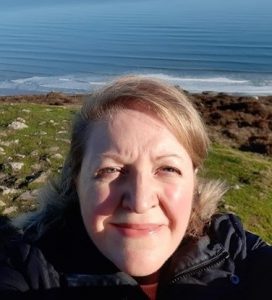 Professor Sasha Handley is a historian of early modern society and culture largely focused on the British Isles. Her interests include histories of daily life (especially the history of sleeping practices), women’s history, environmental history, the history of the body, and supernatural beliefs and practices. An interest in new historical methodologies: material culture and histories of emotion, unites these research themes.
Professor Sasha Handley is a historian of early modern society and culture largely focused on the British Isles. Her interests include histories of daily life (especially the history of sleeping practices), women’s history, environmental history, the history of the body, and supernatural beliefs and practices. An interest in new historical methodologies: material culture and histories of emotion, unites these research themes.
Sasha has published widely in leading academic journals (e.g. History Workshop Journal, Journal of the History of Ideas, Cultural and Social History, Interface Focus) and her monographs include Sleep in Early Modern England (Yale University Press, 2016) and Visions of an Unseen World: Ghost Beliefs and Ghost Stories in Eighteenth-Century England (Pickering & Chatto, 2007; Routledge, 2016). Sasha co-edited the Social History Society’s book series New Directions in Social and Cultural History, published by Bloomsbury, and she is a co-editor of the inaugural book in this series New Directions in Social and Cultural History (2018).
Current research includes Sleeping well in the early modern world: an environmental approach to the history of ‘sleep care’, funded by a Wellcome Trust Investigator Award and a Wellcome Trust Investigator Research Enrichment Award. The project will be the first to investigate the environmental context of early modern sleep practices in the British Isles and early America. Material methodologies (archaeology; microscopy) are key to the project’s success.
Sasha is also part of an international team working on the project ‘Albrecht Dürer’s Material World – in Melbourne, Manchester and Nuremberg’, funded by the Australian Research Council. She is also working on a book (contracted to Doubleday) focused on women’s engagement with early modern ghost reports (A Haunting at the Rectory: a story of women who wanted to be heard).
Funders supporting Sasha’s research include the AHRC, British Academy, Wellcome Trust, and the ESRC. Her international research fellowships include the Folger Shakespeare Library, the Lewis Walpole Library, the Moore Institute (NUI Galway), the Victoria & Albert Museum, McGill University, and The Institute of Historical Research.
Sasha is a keen collaborator with third-party organisations and has delivered successful public engagement and impact activities with: The British Academy, Being Human Festival, The Children’s Sleep Charity and The National Trust. I co-curated the 2016 exhibition Magic, Witches and Devils in the Early Modern World at the John Rylands Library and I regularly contribute to national and international media discussions.
Professor Stefan Hanß (research group leader)
 Prof Stefan Hanß is Professor of Early Modern History at The University of Manchester, Deputy Director and Scientific Lead of The John Rylands Research Institute, University of Manchester, and the research group leader of The Bodies, Emotions and Material Culture Collective. His research focuses on early modern material culture and cultural encounters. Current projects cover the history of early modern hair and feather-working. Stefan has been awarded a British Academy Rising Star Engagement Award and a Philip Leverhulme Prize. He pioneers the use of new methodological trajectories and heuristic tools in material culture studies, e.g. digital microscopy and interdisciplinary collaborations between the humanities and the sciences. Stefan published widely on early modern hair and feathers, as well as on Mediterranean and global history, the history of time, and Ottoman language studies. His research was published in world-leading journals like Central European History, Current Anthropology (forthcoming), Gender and History, German History, History Workshop Journal, Journal of Early Modern History, Past & Present, Renaissance Quarterly, Renaissance Studies, and The Historical Journal. Stefan’s most recent monograph is Narrating the Dragoman’s Self in the Veneto-Ottoman Balkans, c. 1550–1650 (Routledge, 2023); his most recent edited volume is In-Between Textiles, 1400-1800 (Amsterdam University Press, 2023). Stefan is also the author of two monographs on the Battle of Lepanto and three edited volumes on early modern Mediterranean slavery, the Habsburg Mediterranean, and colophons in the early modern world. He is the co-organiser of the Manchester Affective Artefacts seminar series and runs the Microscopic Records blog. Stefan is also an active member of various research groups exploring the relationship between early modern material cultures and emotions, and started recently as a collaborating researcher in the Australian Research Council-funded project Albrecht Dürer’s Material World—in Melbourne, Manchester and Nuremberg. He co-curated the exhibition Albrecht Dürer’s Material World at The Whitworth.
Prof Stefan Hanß is Professor of Early Modern History at The University of Manchester, Deputy Director and Scientific Lead of The John Rylands Research Institute, University of Manchester, and the research group leader of The Bodies, Emotions and Material Culture Collective. His research focuses on early modern material culture and cultural encounters. Current projects cover the history of early modern hair and feather-working. Stefan has been awarded a British Academy Rising Star Engagement Award and a Philip Leverhulme Prize. He pioneers the use of new methodological trajectories and heuristic tools in material culture studies, e.g. digital microscopy and interdisciplinary collaborations between the humanities and the sciences. Stefan published widely on early modern hair and feathers, as well as on Mediterranean and global history, the history of time, and Ottoman language studies. His research was published in world-leading journals like Central European History, Current Anthropology (forthcoming), Gender and History, German History, History Workshop Journal, Journal of Early Modern History, Past & Present, Renaissance Quarterly, Renaissance Studies, and The Historical Journal. Stefan’s most recent monograph is Narrating the Dragoman’s Self in the Veneto-Ottoman Balkans, c. 1550–1650 (Routledge, 2023); his most recent edited volume is In-Between Textiles, 1400-1800 (Amsterdam University Press, 2023). Stefan is also the author of two monographs on the Battle of Lepanto and three edited volumes on early modern Mediterranean slavery, the Habsburg Mediterranean, and colophons in the early modern world. He is the co-organiser of the Manchester Affective Artefacts seminar series and runs the Microscopic Records blog. Stefan is also an active member of various research groups exploring the relationship between early modern material cultures and emotions, and started recently as a collaborating researcher in the Australian Research Council-funded project Albrecht Dürer’s Material World—in Melbourne, Manchester and Nuremberg. He co-curated the exhibition Albrecht Dürer’s Material World at The Whitworth.
Dr Ben Jackson
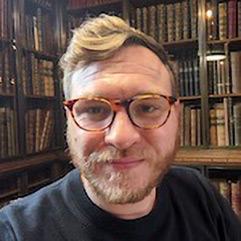 Ben is a social and cultural historian of Britain in the long eighteenth century. He researches the history of gender and masculinities 1660–1832 and is most interested in how the social and economic transformations of eighteenth-century Britain, such as commercialisation, industrialisation and professionalisation, animated gender identity-formation and experience. His first monograph Material Masculinities: Men and Goods in Eighteenth-Century England (forthcoming with Manchester University Press in 2025) is the first book-length study of Englishmen’s material and consumer practices in the period.
Ben is a social and cultural historian of Britain in the long eighteenth century. He researches the history of gender and masculinities 1660–1832 and is most interested in how the social and economic transformations of eighteenth-century Britain, such as commercialisation, industrialisation and professionalisation, animated gender identity-formation and experience. His first monograph Material Masculinities: Men and Goods in Eighteenth-Century England (forthcoming with Manchester University Press in 2025) is the first book-length study of Englishmen’s material and consumer practices in the period.
Ben is currently a British Academy Research Fellow at the John Rylands Research Institute where he is researching the professional, social, and masculine identities of Anglican clergymen 1660–1800 in Britain, Europe, and the British Empire. This research will provide the basis for his next book The Georgian Clergyman: At Home, In the Parish, and Abroad as well as two articles on embodiment and materiality in eighteenth-century clerical letters. Before joining Manchester in 2024, Ben taught early modern history at the University of Birmingham (2021–23) and history at University College London (2019-2021) and Queen Mary, University of London (2017–21).
Dr Gloria Moorman
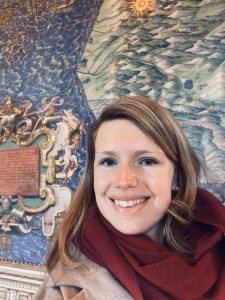 Gloria Moorman is a book historian based at the Department of Modern Languages and Cultures (Italian) and the John Rylands Research Institute and Library (University of Manchester).
Gloria Moorman is a book historian based at the Department of Modern Languages and Cultures (Italian) and the John Rylands Research Institute and Library (University of Manchester).
In her work, she adopts book- and art-historical approaches to investigate the cultural agency of early modern printed artefacts, at the intersection of materiality, (para)text, and imagery. Gloria takes a special interest in Renaissance geography (the reception of Ptolemy) and the representation of cities in word and image (city praise in verse and prose, across Latin and European vernaculars; evolving visual languages from print antiquarianism to painterly vedutismo).
Currently, she is a Research Associate on the AHRC-funded project Envisioning Dante, c. 1472–c. 1630: Seeing and Reading the Early Printed Page, led by Prof Guyda Armstrong (Manchester) and Prof Simon Gilson (Oxford). The Envisioning Dante project will offer the first in-depth analysis of the material features of almost the entire corpus of printings (1472–1629) of Dante’s Divine Comedy.
Gloria’s research departs from a thorough understanding of the inner workings of early modern publishing, markedly the challenges and opportunities involved in the printing of text and imagery across the print centers of early modern Italy and northern Europe. She studied Italian and Book History at the University of Leiden, followed by a PhD at the Centre for the Study of the Renaissance, University of Warwick. In her doctoral dissertation, she studied the development of the early modern town atlas genre, culminating in the first, full publication history of Joan Blaeu’s Theatrum Italiae (1663–1682). Her identification of the spectacularly hand-colored presentation copy of the Savoy Atlas (1682: Royal Library, Turin) as the work of master-colourist Dirk Jansz. van Santen – testifying to the transnational splendour of the connected book and art worlds of the Baroque – was featured among selected essays by researchers “aged under 35” in the Italian journal La Bibliofilia.
The article Medici Rule Reimagined: Cosimo III, the Dutch Republic, and Grand Ducal Aspirations for Seventeenth-Century Tuscany (c. 1667–1723), co-authored with Ingeborg van Vugt, features exciting case-studies on transnational pineapples, a foreign professor of Greek in Pisa, and the marvels of Amsterdam as magazzino del mondo. During his famous sojourns in the Dutch Republic (1667–1669), young Prince Cosimo III de’ Medici (1642–1723) encountered an enticingly modern strain of republicanism. This article argues, for the first time, that the splendour of the Dutch Golden Age proved the ideal décor to reimagine Tuscany’s own, administrative past and present.
Previously, Gloria was a postdoctoral researcher at the university of Padua (2020-2023), and visiting fellow at the Scaliger Institute (Leiden University Library) and the Nederlands Kunsthistorisch Instituut (NIKI) in Florence. Over the years, her work has benefitted especially from the generous support of the Royal Netherlands Institute in Rome (KNIR), the Newberry Library (Chicago), the Bibliographical Society, and the Society for Renaissance Studies.
Dr Stephen Mossman
 Dr Stephen Mossman is a religious, literary and intellectual historian, who works principally on the German- and Dutch-speaking lands in the later Middle Ages. At the core of his research is a concern to grasp the historically-contingent frameworks that give rise to particular social and cultural phenomena, those that are intangible (climates of fear, anxiety, despair and hope) and those that have left more concrete traces in the documentary record (patterns of religious affiliation and social association), and to understand and interpret the material survivals of the past in manuscript and early print, in literature and in art.
Dr Stephen Mossman is a religious, literary and intellectual historian, who works principally on the German- and Dutch-speaking lands in the later Middle Ages. At the core of his research is a concern to grasp the historically-contingent frameworks that give rise to particular social and cultural phenomena, those that are intangible (climates of fear, anxiety, despair and hope) and those that have left more concrete traces in the documentary record (patterns of religious affiliation and social association), and to understand and interpret the material survivals of the past in manuscript and early print, in literature and in art.
He is the author of Marquard von Lindau and the Challenges of Religious Life in Late Medieval Germany: The Passion, the Eucharist, the Virgin Mary (Oxford, 2010) and is currently completing a second monograph provisionally entitled Rulman Merswin and the Knights Hospitaller: Literary Spirituality and Urban Religion in Medieval Germany. He is co-editor of a number of interdisciplinary volumes that encompass his interests in literature and history, most recently Geschichte erzählen: Strategien der Narrativierung von Vergangenheit im Mittelalter (Tübingen, 2020), and sole editor of a two-volume textbook for the teaching of medieval history, Debating Medieval Europe (Manchester, 2020-22).
He read History and German at the University of Oxford and at the Rheinische Friedrich-Wilhelms-Universität Bonn (1997-2001) prior to postgraduate study at Oxford and at the Albert-Ludwigs-Universität Freiburg (2002-06). He was Junior Research Fellow in History at St John’s College, Oxford (2006-09) and appointed to the History department at Manchester in 2009. Subsequently he has held a Marie Curie fellowship in German History at Freiburg (2012-14) and an Alexander von Humboldt fellowship in German at the Berlin-Brandenburgische Akademie der Wissenschaften (2020-21).
Dr Nick Overton
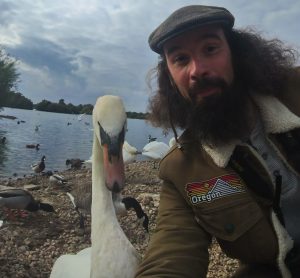 My name is Nick Overton, and I am a Post-Doctoral Research Associate and Archaeologist at the University of Manchester, in the department of Classics, Ancient History, Archaeology and Egyptology. My research focuses on Prehistoric archaeology of North-West Europe, in particular the Mesolithic and Neolithic periods, which span from c.9300 BC-2400 BC. In particular, I am interested in exploring the relationships between humans, animals, materials and environments within these periods.
My name is Nick Overton, and I am a Post-Doctoral Research Associate and Archaeologist at the University of Manchester, in the department of Classics, Ancient History, Archaeology and Egyptology. My research focuses on Prehistoric archaeology of North-West Europe, in particular the Mesolithic and Neolithic periods, which span from c.9300 BC-2400 BC. In particular, I am interested in exploring the relationships between humans, animals, materials and environments within these periods.
In my recent research, I have outlined new ways archaeology can think about humans and animals in the past, which move away from a conception of animals as static material and nutritional resources, and instead consider them as active living beings, with the ability to act, interact, and affect the lives of humans. This approach, which has been termed ‘Social Zooarchaeology’ or ‘Multispecies Archaeology’ is grounded in the data provided by analysis of animal remains from archaeological contexts-the species, age, sex, season and environment can all contribute to developing an understanding of particular encounters between humans and specific individual animals. We can then use this to consider how humans may have formed different understandings of species and individuals, which may have led to different treatments, which we see in the archaeological record. My research on this subject has been published in journals including the Cambridge Archaeological Journal, Journal of World Prehistory and the upcoming Oxford Handbook of Mesolithic Europe. I am currently working on new research that considers the role archaeological evidence can play in current debates surrounding the climate crisis and rewilding practices.
My most recent research has also begun to examine human relationships with materials, and in particular, rock crystal (a pure, transparent form of quartz) in Neolithic Britain. In my recent publication in the Cambridge Archaeological Journal I argue that the sources, appearance, refractive and light emitting properties of this material made it, and moments of using it, arresting and affective. The close association between this material and the remains of the dead suggest this material was used to create distinctive and memorable events, which bound the living together with memories of the deceased.
Dr James Paz
I am a medievalist and a specialist in Old English literature. My research interests include: the voices and agency of nonhuman things in Old English literature; the links between early medieval literature and material culture; the connections between work, craft and creativity in early English culture; modern medievalism (especially in science fiction and fantasy); theoretical approaches to medieval literatures (especially new materialism and ecocriticism). I am supervising PhD students working on Old English environmental literature and on representations of tool-use in early medieval England.
In 2017, I published my first monograph: Nonhuman Voices in Anglo-Saxon Literature and Material Culture. This book makes a new contribution to thing theory by rethinking conventional divisions between animate human subjects and inanimate nonhuman objects in the early Middle Ages. It demonstrates that Old English writers describe artefacts and animals through riddling forms or enigmatic language, balancing an attempt to speak and listen to things with an understanding that these nonhumans often elude, defy and withdraw from us. The book argues that the active role that things have in the early medieval world is linked to the Germanic origins of the word, where a þing is a kind of assembly, with the ability to draw together other elements, creating assemblages in which human and nonhuman forces combine.
My current research project, The Inhumanity of Work and Craft in Old English Literature, will start by exploring the relationship between animal weorc (painful suffering and undergoing) and animal cræft (purposeful doing and making) in early medieval literary sources. It will then examine hybrid beings whose technical skills trouble concepts of human creativity as well as devilish, pagan and monstrous characters whose misuse of craft causes them to lose or gain their humanity.
Dr Alka Raman
Dr Alka Raman is a historian of technological change in global economic history. Currently, she holds the Hallsworth Fellowship in History at the School of Arts, Languages and Cultures at the University of Manchester. Alka’s work explores the transnational roots of technological evolution by examining the influence of pre-industrial Indian cotton textiles on industrialisation in the British and European cotton industries during the 18th and 19th centuries. She focuses on the materiality of technological change and the role of imitations in the evolution of technologies. Her doctoral thesis, Learning from the muse: Indian cotton textiles and British industrialisation, explored the influence of Indian printed and painted cotton textiles on the growth of the British cotton industry in the 18th and 19th centuries, leading to the first Industrial Revolution. She is currently working on her first book manuscript, provisionally titled, From Muse to Machines: Indian Cotton Textiles and British Industrialisation. Alka is also interested in textiles and the trans-Atlantic slave trade, the impact of geography and natural materials on economic growth, as well as industrialisation and the environment.
Prior to the Hallsworth Fellowship, Alka held the ESRC Fellowship at LSE in 2022 and the Economic History Society’s Postan Postdoctoral Fellowship, in affiliation with the Institute of Historical Research, at Victoria and Albert Museum in 2021-2022. She was also guest lecturer at the Victoria and Albert Museum/Royal College of Art, London as well as at the Department of Economic History, LSE, in 2022.
Alka received her PhD from the Department of Economic History, LSE, in 2021. She holds a BA (Honours) and MA in Political Science from Lady Shri Ram College, University of Delhi, and an MSc Research (with Distinction) from the London School of Economics.
Dr Ingrid Rembold
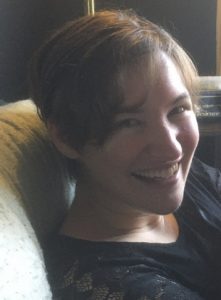 Dr. Ingrid Rembold is a religious, political and gender historian who works primarily on Europe in the eighth and ninth centuries. Her current research examines the relationship between rulers and monasteries in the Carolingian Empire (a polity encompassing most of western Europe from 751-888). In the relative absence of governmental institutions, monasteries have assumed an integral place in modern conceptions of Carolingian rule. Historians have largely focused on the advantages that rulers could derive from their increasingly close association with monasteries and assumed a high level of royal agency in forging and maintaining these relationships. Yet such an approach implicitly, if unintentionally, adopts top-down and male-as-default perspectives, the former insofar as rulers are assumed to be the primary actors, and the latter insofar as male monastic experiences are assumed to be representative, whereas in actuality female institutions developed very differently. Her research seeks to revisit these developments foregrounding issues of agency and gender.
Dr. Ingrid Rembold is a religious, political and gender historian who works primarily on Europe in the eighth and ninth centuries. Her current research examines the relationship between rulers and monasteries in the Carolingian Empire (a polity encompassing most of western Europe from 751-888). In the relative absence of governmental institutions, monasteries have assumed an integral place in modern conceptions of Carolingian rule. Historians have largely focused on the advantages that rulers could derive from their increasingly close association with monasteries and assumed a high level of royal agency in forging and maintaining these relationships. Yet such an approach implicitly, if unintentionally, adopts top-down and male-as-default perspectives, the former insofar as rulers are assumed to be the primary actors, and the latter insofar as male monastic experiences are assumed to be representative, whereas in actuality female institutions developed very differently. Her research seeks to revisit these developments foregrounding issues of agency and gender.
Although her past research has looked at issues relating to manuscript culture, the archaeology of conversion and burial culture, much of Ingrid’s engagement with material culture is pedagogic in nature – from teaching with the rich manuscript holdings of the John Rylands or the Egyptology collection of the Manchester Museum (in a session on late antique and early medieval Egyptian Christianity) to creating her own grave assemblages using Halloween skeletons for students to analyze.
Ingrid is the author of Conquest and Christianization: Saxony and the Carolingian World, 772-888 (Cambridge, 2017), and is currently preparing an edited volume (with Carine van Rhijn and Arthur Westwell) entitled Rethinking the Carolingian Reforms. Her work has appeared in Early Medieval Europe, the Journal of Medieval History as well as in a number of edited collections.
She completed a BA and MSt at the University of Oxford before moving to the University of Cambridge for her PhD (2014). Following her postgraduate study, she was a DAAD postdoctoral scholar at the Georg-August-Universität Göttingen (2014-15) and a Junior Research Fellow at Hertford College, Oxford (2015-18). Ingrid joined the Department of History at Manchester in 2018.
Dr Lewis Ryder
Lewis is a social and cultural historian of modern Britain, with specific interests in the history of empire, collections, exhibitions and the politics of culture. His PhD, undertaken at the University of Manchester (2016-2020), examined the tensions between the democratisation of collecting and the professionalisation of museums in the early twentieth century through the case study of John Hilditch, a collector of Chinese antiquities from a humble background who constantly lied, hoaxed and cajoled in a contest against museum experts over the value of his collection. Lewis’s article on Hilditch can be accessed here. He will expand these findings in his forthcoming book, Connoisseurs and Conmen (MUP).
Lewis is currently a Lecturer in Modern History at the University of Manchester. It is through teaching the history of collecting in the British Empire that inspired his new project, an emotional history of loot in Britain. The project aims to reveal and analyse the British public’s complex and contradictory emotional responses to loot from 1750-1919.
Professor Cordelia Warr
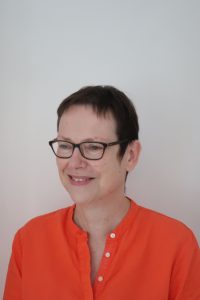 Professor Cordelia Warr studied Fine Art at Newcastle University (1985-1987) and History of Art at Nottingham University (1987-1989). She completed her Ph.D. on Female Patronage and Female Spirituality in Italian Art of the Thirteenth and Fourteenth Centuries in 1994 (University of Warwick).
Professor Cordelia Warr studied Fine Art at Newcastle University (1985-1987) and History of Art at Nottingham University (1987-1989). She completed her Ph.D. on Female Patronage and Female Spirituality in Italian Art of the Thirteenth and Fourteenth Centuries in 1994 (University of Warwick).
Before coming to Manchester, Cordelia taught at Queen’s University Belfast (1999-2003) and the University of Aberdeen (1995-1996). She has also taught for the Open University (1995) and for the American University of Rome (1998). She has held research awards from the Leverhulme Trust (1996-1998 and 2002-2003), the British School at Rome (1991, 1997-1998, 2011), the Gladys Krieble Delmas Foundation (1993), and St. John’s College, Oxford (2003).
She is currently (September 2017 onwards) Co-Editor of the Bulletin of the John Rylands Library, and serves on the committee of the Early Textiles Study Group. She has previously served on the committee of the Ecclesiastical History Society, the Editorial Committee of Manchester University Press from 2012-2015 and was Reviews Editor of the journal Art History from 2007-2011.
She has published widely on the depiction of religious dress including Dressing for Heaven: Religious Clothing in Italy, 1215-1545, Manchester University Press, 2010; ‘The Devil on my Tail: Clothing and Visual Culture in the Camposanto Last Judgement’, Medieval Clothing and Textiles, 2015; ‘Clothing, Charity, Salvation and Visionary Experience in Fifteenth-Century Siena’, Art History 27/2, 2004; and ‘Religious Habits and Visual Propaganda: The Vision of the Blessed Reginald of Orléans’, Journal of Medieval History 28, 2002.
She has also published, with Janis Elliott (Texas Tech University), on art and patronage in Naples: Import/Export: Painting, Sculpture and Architecture in the Kingdom of Naples, special issue of Art History 31/4, 2008 (also published as Art and Architecture in Naples, 1266-1713, Wiley-Blackwell, 2010) and Art, Patronage and Iconography: The Trecento Church of Santa Maria Donna Regina in Naples, Ashgate, 2004).
Cordelia’s current work focuses on miraculous wounds. She has edited, with Anne Kirkham, Wounds in the Middle Ages, Ashgate, 2014. Her forthcoming book on Stigmatics and Visual Culture (Amsterdam University Press, 2022) places the discourse surrounding stigmata within visual culture and investigates how it affected debates about images and image making during the late Medieval and Early Modern periods, with a particular focus on Italy, and on female stigmatics.
Dr Rachel Winchcombe
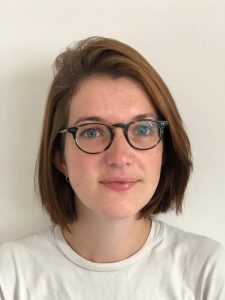 I am a cultural historian of early modern America, with particular interests in the connections between colonial health, embodiment, and environmental change, and in the ways that different colonial relationships, such as those between colonisers and Indigenous peoples, were formed, maintained, and often destabilised. My first book, Encountering early America, was published in 2021 and it explores sixteenth-century English projects in America. It examines how understandings of health, disease, and environmental change, especially in relation to climate and diet, influenced English approaches to exploration and colonisation, arguing that early English engagement with the Americas was highly embodied.
I am a cultural historian of early modern America, with particular interests in the connections between colonial health, embodiment, and environmental change, and in the ways that different colonial relationships, such as those between colonisers and Indigenous peoples, were formed, maintained, and often destabilised. My first book, Encountering early America, was published in 2021 and it explores sixteenth-century English projects in America. It examines how understandings of health, disease, and environmental change, especially in relation to climate and diet, influenced English approaches to exploration and colonisation, arguing that early English engagement with the Americas was highly embodied.
My new project is also focused on embodiment in colonial America and examines the intersections between diet, environment, and emotion in the early English colonies of North America and the Caribbean. My work incorporates methodologies from material culture studies and archaeology in order to interrogate a fuller spectrum of food-related evidence. Using archaeobotanical records and archaeological assemblages of ceramics and other materials related to food production, both abiotic and biotic, the project examines material survivals alongside textual sources to shed new light on colonial foodways, food preparation, both English and Indigenous, Anglo-Indigenous botanical exchange, and American agricultural change.
Find more information here.
Prof Sophie Woodward
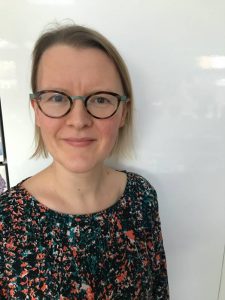 Sophie Woodward is a Professor of Sociology at the University of Manchester who carries out research in the areas of material culture, everyday life and consumption using a range of creative research methods. She has a particular interest in the materiality of unseen domestic spaces – starting with research into women’s wardrobes and more recently through research into dormant things (objects in the home people keep but are not using). She is interested in how these unused things in attics, wardrobes and cupboards can contribute to theories of material vibrancy and potency. She is also interested in feminism and feminist theory and the connections and disruptions between theory, methods and everyday life.
Sophie Woodward is a Professor of Sociology at the University of Manchester who carries out research in the areas of material culture, everyday life and consumption using a range of creative research methods. She has a particular interest in the materiality of unseen domestic spaces – starting with research into women’s wardrobes and more recently through research into dormant things (objects in the home people keep but are not using). She is interested in how these unused things in attics, wardrobes and cupboards can contribute to theories of material vibrancy and potency. She is also interested in feminism and feminist theory and the connections and disruptions between theory, methods and everyday life.
She is the author of five monographs, Material Methods, Birth and Death (with Prof Kath Woodward), Blue Jeans: the Art of the Ordinary (with Prof Daniel Miller), Why Feminism Matters (with Prof Kath Woodward) and Why Women Wear What they Wear.
Her approach is interdisciplinary in terms of theoretical and methodological approaches, as she draws upon methods, theories and approaches from a range of disciplines to think critically and sociologically about everyday life and material relationships. She is a Co-Investigator for NCRM (the ESRC funded National Centre for Research Methods) leading on creative methods. Activities include creating a series of In Conversation events on material methods and are part of her braoder interest in material methods (ways to understand materiality through a range of creative methods, as well as methods that draw on the capacities of objects to provoke and excite responses and new ways of thinking.
Dr Edward Wouk
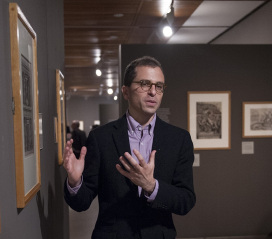 My research investigates the status of the image in early modern art from the ‘Guttenberg revolution’ to the Counter Reformation. Active as a scholar, teacher, and curator of early modern art, I frequently participate in international conferences, symposia, and exhibitions and have published widely, particularly in the field of Netherlandish art history. At Manchester since 2012, I lecture at the undergraduate and postgraduate levels on a wide range of course units, from an introductory survey entitled Ice Age to Baroque to a set of Renaissance lecture and seminar course units devoted to Northern, Italian and global perspectives, as well as tutorials on the history of print, seventeenth-century Dutch painting, the art of Bruegel, and material culture studies. My current interests include the development of artistic theory in Northern Europe, the historiography of Netherlandish art, print culture and global exchange, the rise of the concept of ‘tolerance’ in Counter Reformation Europe, the poetics of beauty in Flemish art, and the intersection of artistic practice and humanism in the early modern period.
My research investigates the status of the image in early modern art from the ‘Guttenberg revolution’ to the Counter Reformation. Active as a scholar, teacher, and curator of early modern art, I frequently participate in international conferences, symposia, and exhibitions and have published widely, particularly in the field of Netherlandish art history. At Manchester since 2012, I lecture at the undergraduate and postgraduate levels on a wide range of course units, from an introductory survey entitled Ice Age to Baroque to a set of Renaissance lecture and seminar course units devoted to Northern, Italian and global perspectives, as well as tutorials on the history of print, seventeenth-century Dutch painting, the art of Bruegel, and material culture studies. My current interests include the development of artistic theory in Northern Europe, the historiography of Netherlandish art, print culture and global exchange, the rise of the concept of ‘tolerance’ in Counter Reformation Europe, the poetics of beauty in Flemish art, and the intersection of artistic practice and humanism in the early modern period.
I studied at Brown University (BA) and the Courtauld Institute of Art (MA), and completed my PhD at Harvard University in 2010 with a dissertation on the Flemish painter, draftsman, and etcher Frans Floris de Vriendt (1519/20-1570). This resulted in two book-length publications: the New Hollstein Dutch and Flemish Woodcuts, Engravings and Etchings volumes on the graphic oeuvre of Frans Floris, appearing in 2011, and a monograph of 2018 entitled Frans Floris (1519/20-1570: Imagining a Northern Renaissance. Before coming to Manchester, I was a Fulbright Scholar in Belgium, a Reader in Renaissance Studies at Harvard’s Villa I Tatti in Florence, Italy, and held post-doctoral fellowships at the Metropolitan Museum of Art in New York and the Courtauld Institute of Art, University of London, where I collaborated on the project ‘Visualising Knowledge in the Early Modern Netherlands’. I returned to Villa I Tatti as the Rush H Kress Fellow for the academic year 2016-2017. My research has been supported by grants from the British Academy, the Renaissance Society of America, the Leverhulme Trust, and the Australian Research Council.
I regularly contribute to exhibitions and conferences on the history of print and printmaking and the circulation of ideas and images in the early modern period. Most recently, I have written entries and essays for Hieronymus Cock: The Renaissance in Print (Paris and Louvain, 2013), Antoine de Granvelle: l’Eminence pourpre (Besançon, 2016-2017), Chiaroscuro Printmaking: Cranach, Raphael, Rubens / Gravure en clair-obscur: Cranach, Raphaël, Rubens (Paris, Musée du Louvre, 2018), and, most recently Giulio Romano: Art and Desire in the Renaissance (Mantua, Palazzo Ducale, 2020-2021).
At Manchester, I have curated two exhibitions: Imprinting the Imagination: Northern Renaissance Prints from the Holtorp Collection (The John Rylands Library, 2014) and the landmark Marcantonio Raimondi and Raphael, co-curated with David Morris and a team of international scholars together with University of Manchester students. Marcantonio Raimondi and Raphael was on view at the Whitworth Art Gallery in 2016-2017 and attracted international attention. The exhibition was accompanied by a volume of scholarly essays as well as an exhibition catalogue, Marcantonio Raimondi, Raphael and the Image Multiplied, published by Manchester University Press. With a team of researchers based in Melbourne and Manchester, I am currently working on an interdisciplinary research project examining Albrecht Dürer’s graphic art from the perspective of material culture. This collaboration will result in several publications as well as another exhibition, due to open at the Whitworth in July 2023, which will feature objects in a range of media borrowed from local and international collection as well as the first display of the Whitworth’s Dürer collection in over fifty years.
See further details here.
Dr Zhaokun Xin
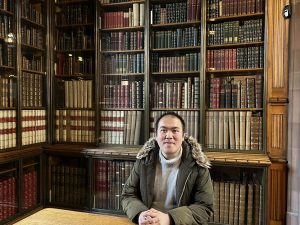 Zhaokun Xin is a lecturer in Chinese Studies, whose research focuses on early modern Chinese literature. Having pursued his studies in Shanghai, Hong Kong, and London, Zhaokun received his doctoral degree from Arizona State University and taught Chinese literature and film at the University of British Columbia before joining Manchester. In his current book project, he draws on affect theory, medical history, and ritual studies to explore literary reconfiguration of emotional norms about anger in early modern China. Another ongoing project investigates the spatiality of same-sex desire in early modern Chinese fiction and drama. Zhaokun’s research approach is highly interdisciplinary and situates literary works in a wide range of discursive fields. His international experience further informs his research interest in literary interactions between early modern China and Japan. Zhaokun’s research has appeared in Chinese Literature: Essays, Articles, Reviews, and Prism: Theory and Modern Chinese Literature. He is also the translator of the simplified Chinese version of Celestial Women: Imperial Wives and Concubines in China from Song to Qing by Keith McMahon.
Zhaokun Xin is a lecturer in Chinese Studies, whose research focuses on early modern Chinese literature. Having pursued his studies in Shanghai, Hong Kong, and London, Zhaokun received his doctoral degree from Arizona State University and taught Chinese literature and film at the University of British Columbia before joining Manchester. In his current book project, he draws on affect theory, medical history, and ritual studies to explore literary reconfiguration of emotional norms about anger in early modern China. Another ongoing project investigates the spatiality of same-sex desire in early modern Chinese fiction and drama. Zhaokun’s research approach is highly interdisciplinary and situates literary works in a wide range of discursive fields. His international experience further informs his research interest in literary interactions between early modern China and Japan. Zhaokun’s research has appeared in Chinese Literature: Essays, Articles, Reviews, and Prism: Theory and Modern Chinese Literature. He is also the translator of the simplified Chinese version of Celestial Women: Imperial Wives and Concubines in China from Song to Qing by Keith McMahon.
Dr Hannah Yip
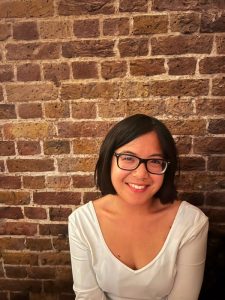 Hannah is a Leverhulme Early Career Fellow working on the artistic and musical pastimes of Protestant divines in the English Reformation. Her doctoral research, undertaken at the University of Birmingham, focused on printed images in the early modern sermon. Hannah has published on homilies and sermons in the Journal of Ecclesiastical History and Reformation.
Hannah is a Leverhulme Early Career Fellow working on the artistic and musical pastimes of Protestant divines in the English Reformation. Her doctoral research, undertaken at the University of Birmingham, focused on printed images in the early modern sermon. Hannah has published on homilies and sermons in the Journal of Ecclesiastical History and Reformation.
In addition to investigating the creativity of churchmen, Hannah has also cultivated an interest in their private emotions beyond the pulpit. With Thomas Clifton, she is the editor of Writing Early Modern Loneliness (under contract, Palgrave Macmillan). Her chapter for this volume explores clergymen’s attitudes, in public and in private, towards loneliness as expressed in their interpretations of Genesis 2:18.
A product of the COVID-19 pandemic, Writing Early Modern Loneliness grew partly from their interests in the feelings of isolation engendered by precarity in both the academy and the creative industries. They were commissioned to write on these issues by The Lancet Psychiatry. In addition, Hannah has a forthcoming chapter on the precarity of newly ordained ministers in the age of Milton in Precarious Milton in a Precarious Age (eds. Jeffrey A. Miller and Esther van Raamsdonk).
International Collaborators
Dr Ethan L. Menchinger
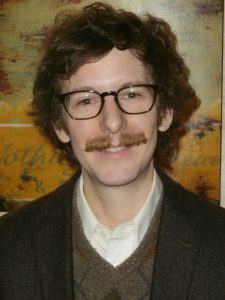 Until 2023, I have been a Lecturer in the History of the Islamic world at Manchester, specializing in the Ottoman Empire, pre-modern Islamic history, and intellectual and cultural production. My research to date has explored various aspects of theology, philosophy, historical writing, and historical and political thought in the Ottoman Empire, focusing on the early modern era and drawing mainly on sources in Turkish and Arabic. I am especially keen to explore how ideas, concepts, and frameworks evolved in the seventeenth and eighteenth centuries, at the cusp of the modern era.
Until 2023, I have been a Lecturer in the History of the Islamic world at Manchester, specializing in the Ottoman Empire, pre-modern Islamic history, and intellectual and cultural production. My research to date has explored various aspects of theology, philosophy, historical writing, and historical and political thought in the Ottoman Empire, focusing on the early modern era and drawing mainly on sources in Turkish and Arabic. I am especially keen to explore how ideas, concepts, and frameworks evolved in the seventeenth and eighteenth centuries, at the cusp of the modern era.
My research has appeared in venues like the Journal of the History of Ideas, the Journal of Islamic Studies, and the Journal of Eighteenth-Century Studies. As of 2018, I am part of the cooperative ERC project GHOST (Geographies and Histories of the Ottoman Supernatural Tradition). Our research team includes scholars across Europe and North America and seeks to explore notions of the strange, marvelous, and supernatural in the Ottoman Empire between ca. 1500 to 1800. I have also been awarded a 2022 membership at the Institute for Advanced Study, in Princeton, to research a project on exceptionalist narratives in Ottoman political-historical thought.
I grew up in the American midwest. Before arriving in Manchester in 2018, I studied at the University of Toronto and the University of Michigan (PhD, 2014). I then held a postdoctoral fellowship at the Forum Transregionale Studien and Freie Universität in Berlin (2014/15), spent a year as visiting scholar at the University of Toronto (2015/16), and served as Lecturer in Early Ottoman History at the University of Michigan (2017).
More information here.
Associate Professor Jenny Spinks
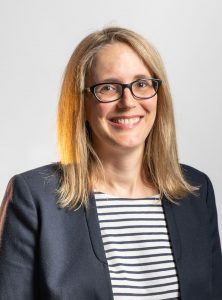 Associate Professor Jenny Spinks is Hansen Associate Professor in History at the University of Melbourne. She teaches and researches the history of early modern Europe, with a particular focus on Germany, France, and the Low Countries. Her research encompasses early modern print culture, material culture, religious identity, and the history of disasters and wonders. From 2021 to 2024 she also leads the Australian Research Council Discovery Project Albrecht Dürer’s Material World – in Melbourne, Manchester and Nuremberg with team members Charles Zika (Melbourne), Matthew Champion (Australian Catholic University), Dagmar Eichberger (University of Heidelberg) and Sasha Handley, Stefan Hanß and Edward Wouk (University of Manchester). Jenny has particular expertise in the use of visual images as historical sources, and this is a feature of the way that her research connects with a broader public. Her community engagement activities include co-curated exhibitions on early modern apocalyptic and supernatural beliefs (collaborators include Sasha Handley and Charles Zika). Jenny’s previous positions include a permanent post in History at the University of Manchester (2012-2017), where she was closely involved with the Embodied Emotions group, and prior to that several years as an Australian Research Council Postdoctoral Fellow (teaching and research) at the University of Melbourne. She has held research fellowships with the Max Planck Institute for the History of Science in Berlin, the Warburg Institute in London, the Herzog August Bibliothek in Wolfenbüttel, and the Australian Research Council Centre of Excellence for the History of Emotions 1100-1800. She has also been awarded research funding by the Australian Research Council in Australia and the Arts and Humanities Research Council in the UK.
Associate Professor Jenny Spinks is Hansen Associate Professor in History at the University of Melbourne. She teaches and researches the history of early modern Europe, with a particular focus on Germany, France, and the Low Countries. Her research encompasses early modern print culture, material culture, religious identity, and the history of disasters and wonders. From 2021 to 2024 she also leads the Australian Research Council Discovery Project Albrecht Dürer’s Material World – in Melbourne, Manchester and Nuremberg with team members Charles Zika (Melbourne), Matthew Champion (Australian Catholic University), Dagmar Eichberger (University of Heidelberg) and Sasha Handley, Stefan Hanß and Edward Wouk (University of Manchester). Jenny has particular expertise in the use of visual images as historical sources, and this is a feature of the way that her research connects with a broader public. Her community engagement activities include co-curated exhibitions on early modern apocalyptic and supernatural beliefs (collaborators include Sasha Handley and Charles Zika). Jenny’s previous positions include a permanent post in History at the University of Manchester (2012-2017), where she was closely involved with the Embodied Emotions group, and prior to that several years as an Australian Research Council Postdoctoral Fellow (teaching and research) at the University of Melbourne. She has held research fellowships with the Max Planck Institute for the History of Science in Berlin, the Warburg Institute in London, the Herzog August Bibliothek in Wolfenbüttel, and the Australian Research Council Centre of Excellence for the History of Emotions 1100-1800. She has also been awarded research funding by the Australian Research Council in Australia and the Arts and Humanities Research Council in the UK.
Assistant Professor Talia Zajac
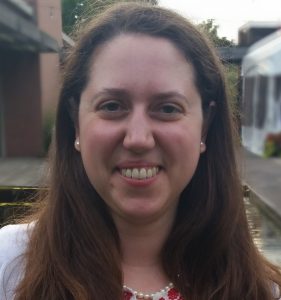 Dr Talia Zajac, Niagara University, is a historian with a particular interest in the roles played by royal brides as cultural vectors between early Rus’ and Latin Christendom. She holds a PhD from the University of Toronto (2017) and previously has taught at the University of Toronto-Mississauga (2017), the University of Nottingham (2018–2019) and the University of Manchester (2019–2020). Zajac held an Eugene and Daymel Shklar Research Fellowship at the Harvard Ukrainian Research Institute (2018), an Andrew W. Mellon Post-Doctoral Fellowship at the Pontifical Institute of Mediaeval Studies (2020–2021), and a Leverhulme Early Career Fellowship at the John Rylands Research Institute and Library Manchester. She continues to be an honorary Research Fellow at this institution and Visiting Scholar at the University of Toronto, Canada. Zajac has published on the religious context of Orthodox-Latin Christian marriage in Byzantinoslavica (2020), on the social and political roles of princesses within Rus’ in A Companion to Global Queenship, edited by Elena Woodacre (ARC Humanities Press / Amsterdam University Press, 2018) as well as essays on royal women and their objects in the Royal Studies Journal (2016) and in Moving Women, Moving Objects (400 –1500), edited by Tracy Chapman Hamilton and Mariah Proctor-Tiffany (Brill, 2019).
Dr Talia Zajac, Niagara University, is a historian with a particular interest in the roles played by royal brides as cultural vectors between early Rus’ and Latin Christendom. She holds a PhD from the University of Toronto (2017) and previously has taught at the University of Toronto-Mississauga (2017), the University of Nottingham (2018–2019) and the University of Manchester (2019–2020). Zajac held an Eugene and Daymel Shklar Research Fellowship at the Harvard Ukrainian Research Institute (2018), an Andrew W. Mellon Post-Doctoral Fellowship at the Pontifical Institute of Mediaeval Studies (2020–2021), and a Leverhulme Early Career Fellowship at the John Rylands Research Institute and Library Manchester. She continues to be an honorary Research Fellow at this institution and Visiting Scholar at the University of Toronto, Canada. Zajac has published on the religious context of Orthodox-Latin Christian marriage in Byzantinoslavica (2020), on the social and political roles of princesses within Rus’ in A Companion to Global Queenship, edited by Elena Woodacre (ARC Humanities Press / Amsterdam University Press, 2018) as well as essays on royal women and their objects in the Royal Studies Journal (2016) and in Moving Women, Moving Objects (400 –1500), edited by Tracy Chapman Hamilton and Mariah Proctor-Tiffany (Brill, 2019).
Associated PhD Students
Scott Backrath
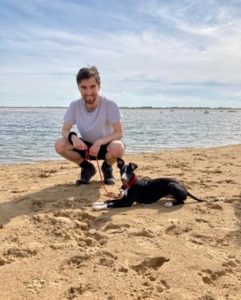 I am a Postgraduate Doctoral Researcher in History here at the University of Manchester. My project is funded by the NWCDTP and is titled Global Biopiracy in the Age of Empire: Indigeneity, Decolonisation, and the Politics of Botanical Knowledge in the British World, c.1600–1800. I will be interrogating how the early modern British Empire conducted biopiracy, or how they acquired botanical knowledge from Indigenous communities in ways that we would now consider illegal. My PhD’s methodology is interdisciplinary, incorporating schools ranging from material culture studies and Critical Indigenous Studies to spatial history and environmental humanities. The core focus is on recovering Indigenous perspectives and lost and silenced Indigenous knowledge. My supervisory team consists of Dr Stefan Hanß, Dr Rachel Winchcombe, and Dr Alex Alberda (Curator of Indigenous Perspectives at Manchester Museum), alongside Prof Sasha Handley.
I am a Postgraduate Doctoral Researcher in History here at the University of Manchester. My project is funded by the NWCDTP and is titled Global Biopiracy in the Age of Empire: Indigeneity, Decolonisation, and the Politics of Botanical Knowledge in the British World, c.1600–1800. I will be interrogating how the early modern British Empire conducted biopiracy, or how they acquired botanical knowledge from Indigenous communities in ways that we would now consider illegal. My PhD’s methodology is interdisciplinary, incorporating schools ranging from material culture studies and Critical Indigenous Studies to spatial history and environmental humanities. The core focus is on recovering Indigenous perspectives and lost and silenced Indigenous knowledge. My supervisory team consists of Dr Stefan Hanß, Dr Rachel Winchcombe, and Dr Alex Alberda (Curator of Indigenous Perspectives at Manchester Museum), alongside Prof Sasha Handley.
I completed my undergraduate degree in Modern History with Economics at the University of Manchester in 2021, graduating with the Dean’s Award for Academic Achievement, The Thomas Frederick and Mary Tout Prize and an Alumni Scholarship. I am due to graduate with an MA in Heritage Studies from the University of Manchester in December 2022.
Florrie Badley
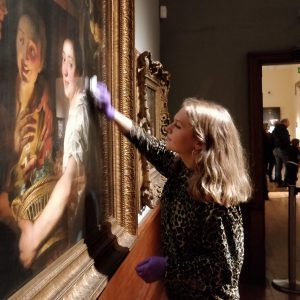 My thesis imagines how Titian, as a sixteenth-century painter, interacted with printed objects as part of his artistic practice. Titled ‘Painting in the Age of Print,’ it explores how the materialities of the print culture in Renaissance Venice impacted Titian’s work and stimulated changes in his painting techniques. My project considers the use, format, texture and graphic technique of the prints that Titian encountered, instead of focusing solely on the imagery that he translated from printed sources into his paintings. This research adds new dimensions to some fundamental debates in the literature on Titian, whilst broadening the study of early modern prints and books as sources of artistic inspiration. It seeks to provide a vital case study in exploring how developments in a new medium can alter the ways in which artists see and understand images, shaping how they think visually through their artworks.
My thesis imagines how Titian, as a sixteenth-century painter, interacted with printed objects as part of his artistic practice. Titled ‘Painting in the Age of Print,’ it explores how the materialities of the print culture in Renaissance Venice impacted Titian’s work and stimulated changes in his painting techniques. My project considers the use, format, texture and graphic technique of the prints that Titian encountered, instead of focusing solely on the imagery that he translated from printed sources into his paintings. This research adds new dimensions to some fundamental debates in the literature on Titian, whilst broadening the study of early modern prints and books as sources of artistic inspiration. It seeks to provide a vital case study in exploring how developments in a new medium can alter the ways in which artists see and understand images, shaping how they think visually through their artworks.
My approach is heavily object-based, drawing visual evidence from Titian’s paintings and the prints themselves as primary sources. This methodology builds on my experience as a postgraduate student. I graduated from the University of Glasgow in 2019 with an MLitt (Distinction) in Technical Art History. My dissertation was based around a practical project in which I analysed multiple versions of the same portrait to assess their attributions and discover their contexts and sequence of creation. The methods I used included Infrared Reflectography, XRF analysis and SEM-EDX, in conjunction with archival research.
I previously graduated from the University of Manchester with a BA (Hons) in Art History, graduating with the Dean’s Award for Academic Achievement. My PhD research is joint funded by NWCDTP and the President’s Doctoral Scholar Award, supervised by Dr Edward Wouk, Dr Cordelia Warr and Dr Guyda Armstrong. In 2022 I will be splitting my time between Doha and the UK.
Eyüp Ensar Dal
 I am a Postgraduate Doctoral Researcher in History at the University of Manchester. My PhD project, titled Early Modern Ottoman Parenthood: Emotions, Family, and Law in Eighteenth-Century Istanbul, explores the world of early modern Ottoman society, focusing on the experiences of parents and the concept of parenthood within both social and legal contexts. I utilise eighteenth-century court records from Istanbul and authoritative judicial opinion, conducting a comprehensive socio-legal analysis. This allows for studying the relationship of family, emotions, and law in the making of Ottoman society and the understanding of gendered parental experiences and parent-child relations in Istanbul in particular. Besides, I adopt an interdisciplinary approach by employing early modern Ottoman manuscripts containing stories, diaries, ethical treatises, and advice literature, alongside visual cultural materials, to conduct context-based investigations of court proceedings. My PhD project, supervised by Prof Stefan Hanß and Dr Ethan Menchinger, is funded by the AHRC NWCDTP PhD Award.
I am a Postgraduate Doctoral Researcher in History at the University of Manchester. My PhD project, titled Early Modern Ottoman Parenthood: Emotions, Family, and Law in Eighteenth-Century Istanbul, explores the world of early modern Ottoman society, focusing on the experiences of parents and the concept of parenthood within both social and legal contexts. I utilise eighteenth-century court records from Istanbul and authoritative judicial opinion, conducting a comprehensive socio-legal analysis. This allows for studying the relationship of family, emotions, and law in the making of Ottoman society and the understanding of gendered parental experiences and parent-child relations in Istanbul in particular. Besides, I adopt an interdisciplinary approach by employing early modern Ottoman manuscripts containing stories, diaries, ethical treatises, and advice literature, alongside visual cultural materials, to conduct context-based investigations of court proceedings. My PhD project, supervised by Prof Stefan Hanß and Dr Ethan Menchinger, is funded by the AHRC NWCDTP PhD Award.
Previously, I completed my MA with the thesis titled ‘The Social Construction of Childhood in the Ottoman Society: A Socio-legal Analysis of Childcare in Early Eighteenth-Century Üsküdar’ in History at Middle East Technical University. I also graduated from Middle East Technical University with a BA in History.
Lucy Elliott
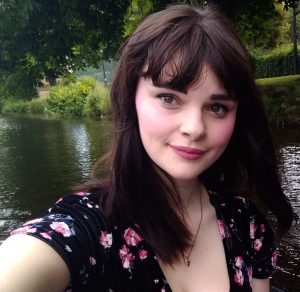 Lucy Elliott is a PhD student at the University of Manchester. She received a BA in History and MA History of Medicine from Newcastle University. Lucy’s research interests centre on early modern cultural and medical histories, with particular focus upon Britain and England’s American colonies. Her PhD thesis will explore how the early modern environment and climatological change shaped the practice and perception of sleep and how sleeping bodies functioned.
Lucy Elliott is a PhD student at the University of Manchester. She received a BA in History and MA History of Medicine from Newcastle University. Lucy’s research interests centre on early modern cultural and medical histories, with particular focus upon Britain and England’s American colonies. Her PhD thesis will explore how the early modern environment and climatological change shaped the practice and perception of sleep and how sleeping bodies functioned.
Vendy Hoppe
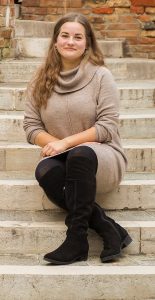 I am a PhD candidate at the Department of History working on socio-economic history and material culture with a focus on textiles during the Renaissance. My ESRC-funded PhD project titled “Velvets in Renaissance Europe: Making Consumerist Cultures, ca. 1400 – 1700” is supervised by Dr Stefan Hanß and Prof Sasha Handley. In my research I seek to uncover the material, societal, and economic significance of velvets in various courts and cities of Renaissance Italy, France, and Bohemia. My methodology combines thorough archival research with material culture and textile studies’ approaches to enlighten the making, meanings, and uses of velvets during the Renaissance.
I am a PhD candidate at the Department of History working on socio-economic history and material culture with a focus on textiles during the Renaissance. My ESRC-funded PhD project titled “Velvets in Renaissance Europe: Making Consumerist Cultures, ca. 1400 – 1700” is supervised by Dr Stefan Hanß and Prof Sasha Handley. In my research I seek to uncover the material, societal, and economic significance of velvets in various courts and cities of Renaissance Italy, France, and Bohemia. My methodology combines thorough archival research with material culture and textile studies’ approaches to enlighten the making, meanings, and uses of velvets during the Renaissance.
I completed my undergraduate degree in History with French at the University of Manchester in 2019 (First class honours) before moving the University of Warwick for my Master’s degree at the Centre for the Study of Renaissance. My thesis titled “The World in a Shop: Foreigners Shopping in Venice, ca.1400-1620” received the Sir John Hale Prize for Best MA Dissertation and I graduated from Warwick in 2020 with a distinction. In 2021-2022 I am holding a visiting studentship at the European University Institute in Florence and conducting archival research in Italy.
Read more here
Gillian Redfern
 As a mature student I completed my BA at Manchester, followed by an MA in Medieval and Early Modern Studies, funded by a generous bursary from the John Rylands Research Institute and Library. Currently I am preparing my AHRC funded PhD thesis for submission in early 2022. I am currently working as a Graduate Teaching Assistant, and have tutored and mentored on the Manchester Access Programme, and worked with the Widening Participation team at Manchester. I have a short article published, ‘The Implications of a Thorn that isn’t a Thorn’, Notes and Queries, 264:2 (2019), 195-97, and am preparing another article based on my PhD research for submission to a journal. My thesis takes an ecocritical approach to selected medieval religious drama, exploring how these plays can be read as local responses to historic climate phenomena. Most recently, my research has considered the notions of ethics and ecomaterialism in the Towneley manuscript’s Mactatio Abel play. Here, I explore how the play relies on a local understanding of the word coal to illustrate the notion of eating coal as a purgative to cleanse the body of sin. Adding to research on the ecomateriality of coal, my work exposes the full materiality of coal that moves beyond its traditional co-mobidity with filth, pollution, and disease. In my reading of the play, bodies are imbricated with the material of their local environments, creating an ‘inbodied’ ecomateriality that restores their spirituality. In doing so, an appreciation of coal as a vital and vibrant agent of ethical change is revealed, and an understanding of a restorative, co-constitutive relationship between bodies and the matter of coal emerges – a relationship with timely relevance to global discussions on the need to recalibrate our relationship with fossil fuels, and coal in particular.
As a mature student I completed my BA at Manchester, followed by an MA in Medieval and Early Modern Studies, funded by a generous bursary from the John Rylands Research Institute and Library. Currently I am preparing my AHRC funded PhD thesis for submission in early 2022. I am currently working as a Graduate Teaching Assistant, and have tutored and mentored on the Manchester Access Programme, and worked with the Widening Participation team at Manchester. I have a short article published, ‘The Implications of a Thorn that isn’t a Thorn’, Notes and Queries, 264:2 (2019), 195-97, and am preparing another article based on my PhD research for submission to a journal. My thesis takes an ecocritical approach to selected medieval religious drama, exploring how these plays can be read as local responses to historic climate phenomena. Most recently, my research has considered the notions of ethics and ecomaterialism in the Towneley manuscript’s Mactatio Abel play. Here, I explore how the play relies on a local understanding of the word coal to illustrate the notion of eating coal as a purgative to cleanse the body of sin. Adding to research on the ecomateriality of coal, my work exposes the full materiality of coal that moves beyond its traditional co-mobidity with filth, pollution, and disease. In my reading of the play, bodies are imbricated with the material of their local environments, creating an ‘inbodied’ ecomateriality that restores their spirituality. In doing so, an appreciation of coal as a vital and vibrant agent of ethical change is revealed, and an understanding of a restorative, co-constitutive relationship between bodies and the matter of coal emerges – a relationship with timely relevance to global discussions on the need to recalibrate our relationship with fossil fuels, and coal in particular.
Esther Rollinson
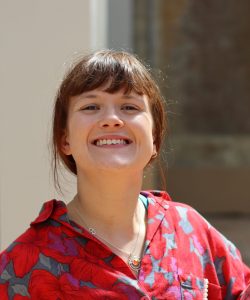 I am a PhD student in History at the University of Manchester. My project, funded by the School of Arts, Languages, and Cultures, is entitled ‘Revisiting the English Catholic Household: Faith, Family, and Identity, 1660-1750’. This thesis explores the role of the household as a site for the cultivation and expression of Catholic devotional cultures in early modern England.
I am a PhD student in History at the University of Manchester. My project, funded by the School of Arts, Languages, and Cultures, is entitled ‘Revisiting the English Catholic Household: Faith, Family, and Identity, 1660-1750’. This thesis explores the role of the household as a site for the cultivation and expression of Catholic devotional cultures in early modern England.
I am particularly interested in the role of women in the creation of household devotional culture and my thesis explores both the spiritual and material literacy of Catholic women in the seventeenth and eighteenth centuries. I am interested in how Catholic women used their medieval material culture alongside contemporary practices of making to create a distinct religious identity. I have looked especially at the role of embroidery as both a devotional exercise and an essential craft in the creation of articles of faith.
I have used digital microscopy throughout my research to examine a number of surviving textiles used in the practice of household masses. I am using this technology to examine the detail of metal thread designs and to consider the importance of textile design in the creation of affective, sacred spaces.
I completed my undergraduate degree at the University of Oxford (2015-2018) before moving to the University of St. Andrews (2019-2020) to undertake a master’s in Early Modern History.
Niels Weijenberg
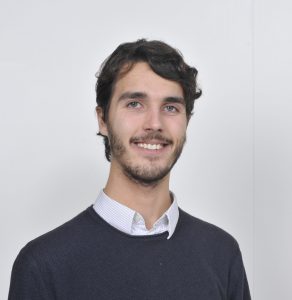 My current research examines the rise of visual representations of universal language in the early modern Low Countries. The starting point for this project is an investigation into the humanist quest for the Adamic language, which was believed to be given by God to Adam in Paradise, and to have vanished as punishment for the construction of the Tower of Babel. Considering a range of images across media, my research explores the ways in which artists attempted to give visual form to the concept of a universal language, with particular focus on the exquisite writing manuals of the so-called ‘Golden Age of Dutch Calligraphy’ and grotesque alphabet books. As a postgraduate researcher in the Department of Art History and Cultural Practices, with my dissertation I aim to offer a novel interpretation of these images as objects of central importance to emerging notions of political and religious identity during the Dutch Revolt (1568-1648).
My current research examines the rise of visual representations of universal language in the early modern Low Countries. The starting point for this project is an investigation into the humanist quest for the Adamic language, which was believed to be given by God to Adam in Paradise, and to have vanished as punishment for the construction of the Tower of Babel. Considering a range of images across media, my research explores the ways in which artists attempted to give visual form to the concept of a universal language, with particular focus on the exquisite writing manuals of the so-called ‘Golden Age of Dutch Calligraphy’ and grotesque alphabet books. As a postgraduate researcher in the Department of Art History and Cultural Practices, with my dissertation I aim to offer a novel interpretation of these images as objects of central importance to emerging notions of political and religious identity during the Dutch Revolt (1568-1648).
I am interested in combining my fascination for art, history and language into new interdisciplinary approaches to cultural heritage. At Utrecht University, I earned my BA specialising in the arts and cultures of the 16th century Low Countries and Italy. As an intern at the Gerson Digital Research Project (RKD, The Hague), I analysed the mobility of early modern Netherlandish artists around Europe, particularly in Northern Italy. During my Masters at The Courtauld Institute of Art in London (MA History of Art), I studied the close interwovenness of visual art and scholarship in the early modern Netherlands. In 2020-2021, I completed a second Masters degree (MSc) in Culture, Organisation and Management at the Vrije Universiteit Amsterdam, which looks at organisations through the scope of cultural anthropology.
My PhD is supported by a School of Arts, Languages and Cultures PhD Studentship, funded by the University of Manchester.
Xiying Wang
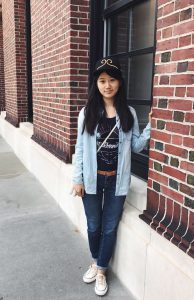 Xiying Wang is a PhD student in the Department of Art History and Cultural Practices. She studied Philosophy at Renmin University of China (2016-2019) and finished a dissertation focusing on the structure, the legitimacy, and the difficulties in Dante’s conceptualisation of Empire. She completed an MA in History of Art and Visual Studies at University of Warwick (2019-2020), with a dissertation on the nudity in the images of the manuscript Egerton MS 943.
Xiying Wang is a PhD student in the Department of Art History and Cultural Practices. She studied Philosophy at Renmin University of China (2016-2019) and finished a dissertation focusing on the structure, the legitimacy, and the difficulties in Dante’s conceptualisation of Empire. She completed an MA in History of Art and Visual Studies at University of Warwick (2019-2020), with a dissertation on the nudity in the images of the manuscript Egerton MS 943.
Her current research focuses on the visualisation of nudity in Italian art in late medieval or early Renaissance. The investigation starts with a text-based analysis in Dante’s Commedia, in which the texts as well as relevant commentaries appertained to key words such as nudo, ignudo, corpo, carne, anima, ombra, spirito, persona, omo, effige are examined. It is to be hoped Dante’s vision and insight into embryology and anthropology will serve as the basis of researching into images of nudity. In the second part of this research, the imageries of nudity in different contexts in relation to religion, social history, gender issue and politics would be examined. Through investigating this specific visual representation, she aims to examine the polyvalence of the unclothed body in c.1300-1450 and display the importance of nudity not only concerning art history and its interdisciplinary academic studies but also regarding understanding humanity and an individual’s relation with the other and communities.
Georgina Watson
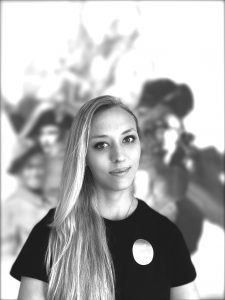 As a second-year candidate on the University of Manchester’s PhD History Programme, my thesis War, Wealth and God’s Will: The Order of Saint Stephen between Crusade and Commerce in the Late Sixteenth Century examines the (dis)connections of early modern Mediterranean trade, crusade and religious interactions between the Grand Duchy of Tuscany and the Ottoman Empire. Charting the similarities and differences of the human experience within the Mediterranean of the late sixteenth century; I seek to understand the emotional drive of select individuals and their impact on religious, military, and commercial interaction within Grand Ducal Tuscany and the wider Mediterranean. Using highly personal correspondence and highlighting the use of non-elite protagonists of the Order of Saint Stephen, I present the perspectives of marginalised individuals of Tuscan society (named captives and non-Tuscan citizens, Sephardic Jewish subjects, and slaves) who aided the Knights of Saint Stephen in their commercial and religious operations. My research does not ignore their part in trans-Mediterranean commercial, spiritual, and military interaction. Instead, it heightens the contribution of enslaved Jewish and Muslim individuals in connecting the Mediterranean of the late sixteenth century within inter-religious and commercial negotiations.
As a second-year candidate on the University of Manchester’s PhD History Programme, my thesis War, Wealth and God’s Will: The Order of Saint Stephen between Crusade and Commerce in the Late Sixteenth Century examines the (dis)connections of early modern Mediterranean trade, crusade and religious interactions between the Grand Duchy of Tuscany and the Ottoman Empire. Charting the similarities and differences of the human experience within the Mediterranean of the late sixteenth century; I seek to understand the emotional drive of select individuals and their impact on religious, military, and commercial interaction within Grand Ducal Tuscany and the wider Mediterranean. Using highly personal correspondence and highlighting the use of non-elite protagonists of the Order of Saint Stephen, I present the perspectives of marginalised individuals of Tuscan society (named captives and non-Tuscan citizens, Sephardic Jewish subjects, and slaves) who aided the Knights of Saint Stephen in their commercial and religious operations. My research does not ignore their part in trans-Mediterranean commercial, spiritual, and military interaction. Instead, it heightens the contribution of enslaved Jewish and Muslim individuals in connecting the Mediterranean of the late sixteenth century within inter-religious and commercial negotiations.
Why not tune into Durham University’s MEMSA Crossing Borders, Contesting Boundaries podcast series in April 2022 where I will be discussing the fragmented socio-political climate of the seventeenth-century Mediterranean and the relationship between Fakhr ad-Din al-Ma’n II, Emir of Mount Lebanon, and Cosimo II de’ Medici, Grand Duke of Tuscany. Through the personal correspondence of the exiled Lebanese Emir Fakhr ad-Din al-Ma’n II, I offer an Ottomancentric perspective of Christian-Muslim interactions within the Court of Grand Ducal Tuscany between 1609 and 1613.
Ellen Sophie Werner
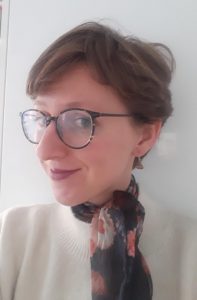 I am a PhD student in English and History at the University of Manchester, working on early modern cultures of reading in North West England based on a study of annotated books in Chetham’s Library in Manchester. My research is supervised by Dr Fred Schurink and Prof Sasha Handley of the University of Manchester and Dr Fergus Wilde at Chetham’s Library. The project is funded by the NWCDTP and seeks to bring readers in the North West, an area which has hitherto received little attention in the field of book history, into focus. I am especially interested in books as material objects and the ways in which readers contribute to and change these objects by their annotations and other marks of reading.
I am a PhD student in English and History at the University of Manchester, working on early modern cultures of reading in North West England based on a study of annotated books in Chetham’s Library in Manchester. My research is supervised by Dr Fred Schurink and Prof Sasha Handley of the University of Manchester and Dr Fergus Wilde at Chetham’s Library. The project is funded by the NWCDTP and seeks to bring readers in the North West, an area which has hitherto received little attention in the field of book history, into focus. I am especially interested in books as material objects and the ways in which readers contribute to and change these objects by their annotations and other marks of reading.
My other research interests include classical reception, Neo-Latin poetry and multilingualism, all topics that combine my interest in English literature and history of the early modern period with my love for Classics. I completed my undergraduate degree in English and Latin at the University of Bamberg, Germany, before moving to London, where I received my MA in Early Modern Literature: Text and Transmission from King’s College London in 2022. My MA dissertation examined the interactions of language and poetic form in multilingual poetry collections of the late sixteenth and early seventeenth centuries. Both my undergraduate and graduate degrees were funded by the German Scholarship Foundation (Studienstiftung des Deutschen Volkes).
Former Members
- Dr Stephen Gordon
- Dr Marina Inì
- Dr Sarah Johanesen
- Dr Aneurin (Nye) Merrill-Glover
- Dr John Morgan
- Dr Sarah Ann Robin
- Dr Emily Rowe
- Professor Julie-Marie Strange
- Dr Rebecca Whiteley
